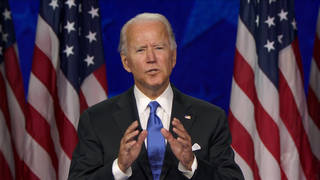
Guests
- Nikole Hannah-Jonesaward-winning reporter covering racial injustice at The New York Times Magazine.
- Lee Fanginvestigative journalist at The Intercept covering the intersection of money and politics.
We discuss what led to Donald Trump’s surprise victory with Nikole Hannah-Jones, who covers racial injustice at The New York Times Magazine, and Lee Fang, investigative journalist at The Intercept covering the intersection of money and politics.
Transcript
AMY GOODMAN: Nikole Hannah-Jones, you tweeted last night, “Its dishonest for the media to keep saying this was about working class anger, that this was populist. That erases us. And it’s wrong.” You said, “black working class suffered far more from these policies than white Americans and didn’t go for Trump.”
NIKOLE HANNAH-JONES: Yeah, I think that’s the narrative that media has been using to comfort itself over the last months of this campaign, is that this a problem of the backwards and racist white America that is not representative of white Americans overall. And we just know that that’s not true. We know that, at least with early numbers, that he was winning across the board—yes, he won a very high percentage of the white working-class vote, but if this were simply about economic anxieties, who has more economic anxieties than black Americans, whose unemployment rates are at disastrous levels even now, 12 percent unemployment rate, who have been hurt by these policies more than any other group? If you name the statistic, black Americans are at the bottom of that statistic. Yet they did not go for Trump, Latinos did not go for Trump, Asian Americans did not go for Trump. So I think that this is the—this is the myth that we need to tell ourselves, when really I think we were ignoring the extent of racial anxiety, racial fear, that was across the board in this country. And we do that to our peril.
And I’d like to say, you know, I don’t know that Bernie being the candidate would have had made a difference, because what we also know was that, I think, this is the first election, presidential election, in 50 years without the Section 2 clearance, preclearance, of the Voting Rights Act. We know that that had an effect. We also know that Trump was able to get much larger white turnout. So, I don’t know that that would have made a difference. I do think the Democratic Party has an issue.
LEE FANG: But also clear is—
AMY GOODMAN: Lee Fang?
LEE FANG: Trump outperformed Romney among African Americans, among Asian Americans, among Latinos. He got a higher share of those votes than Mitt Romney, than John McCain. I think it’s incredibly reductionist to simply say that America is too racist. Obama won Indiana. Obama won the white working class in counties all over this country. Nate Cohn, the polling expert from The New York Times, notes that in white working-class districts where Obama performed strongest, saw the biggest drop-offs in support going to Trump. So, you know, I think it’s dangerous for Democrats to simply say that America is too racist or sexist to support progressive policies or Democrats. There’s a lot more at stake here. Obviously, Trump used a lot of racial and ethnic appeals. But look at his closing ad. Look at his—how he distinguished himself from the rest of the Republican field. It was through economic policies. He was the only Republican campaigning for presidency—the presidency that said he would protect Social Security and Medicare, while Democrats across the board have been calling for these cuts, every Republican has been calling for cuts. He’s thrown out the traditional Republican and Democrat playbook and said, you know, “I want to renegotiate NAFTA. I want to destroy and rip up these free trade deals that have devastated working-class America.” So, you know, obviously, identity issues played a part here, but it’s very dangerous to simply say that America is too racist or sexist.
NIKOLE HANNAH-JONES: I want to—
LEE FANG: Trump actually performed considerably well, given the context of this race among racial and ethnic minorities.
AMY GOODMAN: Nikole?
NIKOLE HANNAH-JONES: Well, I was just going to say, I don’t know who on this panel said that racism and—was the only reason for this. But what I am saying is we clearly know that there was voter suppression. We know that there were court rulings coming down to the last minute. And you cannot change whether people can vote or not, what ID they need at the last minute, and expect that that’s not going to have an impact. We know this is the first presidential election when—when Obama won in 2012, he won with a minority of the white vote. When he won in 2008, he also won with a minority of the white vote. But we did not—we also had preclearance of the Voting Rights Act. So I think we cannot deny that that has had an impact, and that Trump was able to bring out larger white turnout.
AMY GOODMAN: We’re going to—
JOHN NICHOLS: I want to pick up on that, if I—
AMY GOODMAN: We have to break, and we’re going to come back to this discussion. We are doing our post-election show. Yes, this is the day after. Our guests are Nikole Hannah-Jones of New York Times Magazine, Lee Fang of The Intercept, Linda Sarsour of MPower, John Nichols of The Nation and Jose Antonio Vargas of Define American. This is Democracy Now! Back in a minute.












Media Options